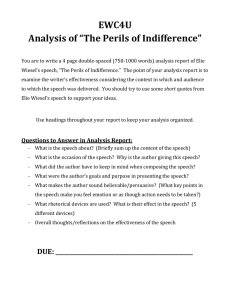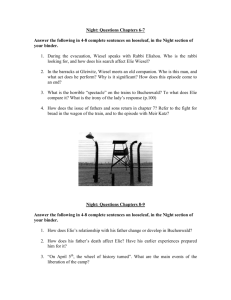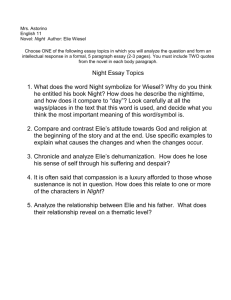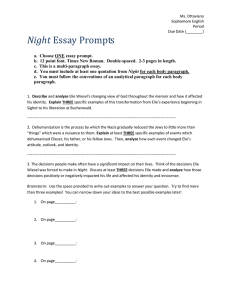Night * Text Study - Ms Paine's Classroom
advertisement
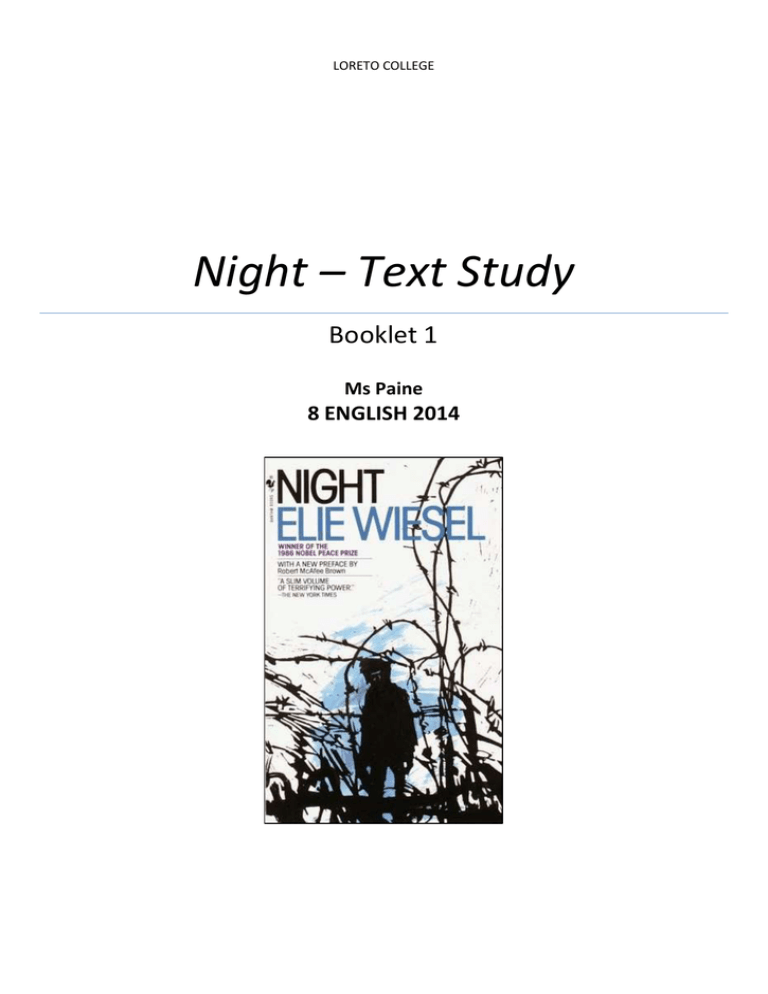
LORETO COLLEGE Night – Text Study Booklet 1 Ms Paine 8 ENGLISH 2014 Night by Eli Wiesel – Pre-Reading Webquest PART 1: Instructions: Working with a partner, carefully research each topic listed below. You must only use the resources available through the Webquest website (address below). Make sure that your notes are extensive and detailed, as you will need some knowledge of the Holocaust and World War 2 to truly understand Eli Wiesel’s memoir, Night. You are required to write at least five dot points of useful information under each topic. Use the five questions contained in the text box to help guide your notetaking. The answers are to be handwritten in your workbooks. They must not be typed. You will need them in lesson. Website: http://zunal.com/webquest.php?w=166419 It can also be accessed through a link Ms Paine’s blog at www.painejulieta.edublogs.org . (Note: Please ignore any reference to assessment in the Webquest. You are only required to do the work on this handout.) 1. Adolf Hitler 2. Nazi Party 3. Third Reich 4. World War 2 5. SS 6. Kristallnacht 7. Warsaw Ghetto 8. Resistance 9. Final Solution 10. Concentration Camp 11. Auschwitz 12. Death Marches 13. Holocaust 14. Eli Wiesel PART 2: Choose one of the videos that you watched during the WEBQUEST and explain why it moved you. 1. 2. 3. 4. 5. 6. 7. Title of video chosen. Describe the content of your chosen video. Why did you choose the video? What images did you find powerful? Was there anything memorable about the sound or dialogue? What other elements stood out for you? Now, can you explain why you found this video so emotionally potent? Give at least three reasons for your answer. 1 2 Night - Reading Journal Instructions: Complete these questions as you read the memoir in your English workbooks. CHAPTERS 1 AND 2 PERSONAL RESPONSE 1. What is your reaction to Moché the Beadle? What do you think about his treatment by the villagers after his return from Poland? Moche, despite his poverty, he is very religious and works in the temple. The villagers refuse to listen Moche’s warnings about the Nazis, after he returns, because he is considered to be of a very lowly social status and has no authority. They also don’t believe that what happened to the other Jews could happen to them. ANALYZING LITERATURE Recall and Interpret 2. Describe Wiesel’s community at the beginning of the story. How does young Elie view the world and his place in it? Wiesel’s village, Sighet, is a small village community in Rumania. The people are supportive of each other and there is a strong sense of community and being good neighbours. They see the war and the Nazi threat as something distant and far away from them. Wiesel at this stage of his life, sees his purpose as the only son, is to focus on his religious studies. He has a very strong faith in God. 3. What are some incidents that suggest or foreshadow the coming danger to the Sighet Jews? Why doesn’t the community believe it is in danger? Moshe the Beadle returns after being deported by the Nazis and describes how he and the other Jewish deportees were massacred. German officers from the Gestapo visiting the ghetto Elie’s father saying that the wearing of the stars weren’t that bad, followed in brackets by the statement “Poor father! Of what then did you die!”. Night before they were to be deported, a police officer and friend of the family knocked at one of their windows and tried to warn them. Madame Schacter’s prophetic warning of seeing a “fire”, that hints at the gas chambers and crematoriums of the concentration camps. Famiy maid offer Elie’s family a place to stay. Elie’s father refues to sell-up and immigrate to Palestine. 4. What are the conditions on the Jews’ train journey? How do the Jews react to Madame Schäcter’s behavior? What does this reveal about human nature? On their train journey to the concentration camps, the Jewish people exist in cramped, dirty condition with almost nowhere to sit or lie down and little or no food or water. The other Jews believe that Madame Schacter has gone mad and try to ignore her warnings about the “fire” and focus solely on themselves and their own family’s survival. 3 Evaluate and Connect 5. What connection might there be between Madame Schäcter’s treatment on the train and possible future events in the concentration camp? What are some other ways that Wiesel foreshadows, or hints at, the horrors ahead? Foreshadowing is a technique where a writer hints at what is to come in a text, so as to increase tension and suspense. Madame Schacter’s cry of “fire” foreshadows the fires in the crematorium. Weisel’s distant cousin asking for information about his family, which highlight that people are disappearing (being killed) with no explanation. Eventually, many people will become more interested in looking after themselves than others. Moche the Beadle’s warnings about what the Nazis are doing to the Jews, as he survived a massacre. The attempt by the Hungarian police officer to warn Wiesel’s family about what is to come. 6. Even though it was 1944, and Nazi extermination of Jews had begun years earlier, the Sighet Jews had very few facts about it. Do you think it is possible in today’s world for a community to know so little, to be so unprepared? Explain. In today’s western society, it would almost impossible for a community not to know about any potential threats due to widespread access to the internet and news reports via television and radio that almost instantaneous. There is also the use of mobile phone networks and social media to warn people about potential disasters. CHAPTERS 3 TO 5 PERSONAL RESPONSE 1. When he arrives at Auschwitz and then at Buna, Wiesel describes scenes he will never forget. What scenes, ideas, or feelings from the memoir do you find unforgettable? Lining people up to go to the gas chambers then the crematorium. Using babies target price “Men to the left, women to the right” Eight words spoken quietly, indifferently without emotion. Eight simple words. Yet that was the moment that I left my mother. (pg.29) Dumping bodies, without respect. “Never shall I forget” (pg.32) is repeated several times to highlight to the reader how significant these events are to the young Elie and how they will impact the rest of his life. Digging their own graves. “I pinched myself. Was I still alive” (pg. 32) These events are so awful, that Wiesel wants to make certain that it isn’t a nightmare. ANALYZING LITERATURE Recall and Interpret 2. Describe the conditions first at the Birkenau reception center, then at Auschwitz, and later at Buna. How does Wiesel’s relationship with his father change during this time? 4 Conditions at Birkenau and Auschwitz People are divided into working groups, some are sent to the gas chambers Sleep three to a bunk, given little in terms of food and clothing, and participate hard labour. Elie and his father become closer as they rely on each other to motivate them to survive. Elie feels that he is responsible for this father, and is ashamed when he doesn’t try to stop a beating of him. 3. What events lead to the two hangings Wiesel describes? How does Wiesel feel about his evening meal after each hanging? What do his reactions suggest about how he is changing? The first hanging was of a young man who was convicted stealing during an air raid, when prisoners are banned from moving about the camp. After the first hanging Wiesel’s meal that night “tasted better than ever…” (pg. 63), because of the way the young man had proudly declared “Long live liberty! My curse on Germany!” The second group of men including the young boy were executed for stockpiling weapons, that could have been used against their Nazi captors. Wiesel described that his soup tasted “like corpses” after the second hanging, because he witnessed the way the young boy who was executed suffered as his was hanging botched. 4. What are some ways that Wiesel and the other Jews at the camps try to observe their religion? How have Wiesel’s feelings about God changed since his captivity began? Evaluate and Connect 5. In the camps, Wiesel must struggle to stay alive and to remain human. In your opinion, how well does he succeed with his struggles? Weisel maintains his humanity despite his intense struggle to remain alive in the camps, through his relationship with his father and with other boys of the same age. This connection to others is a sign that he still values his own and other lives equally. 6. There are several discussions about resistance by the prisoners. Why do you think there was no large scale effort to resist? There was no large scale resistance by the prisoners to the Nazis due to their fear of being punished with death. The prisoners were also in no real physical condition to escape as they were often malnourished and poorly dressed. CHAPTERS 6 TO 9 PERSONAL RESPONSE 1. What feelings and thoughts went through your mind as you read about Wiesel’s final experiences as a German prisoner? What would you say if you could talk to him about this time inhis life? What would you want him to explain to you? 5 ANALYZING LITERATURE Recall and Interpret 2. Why do Wiesel and his father leave Buna? How do they respond to the circumstances of the forced march? Wiesel and his father are forced to leave Buna and head inside Germany by their captors, as the Russians are too close to the camp. Wiesel takes responsibility on himself to motivate his father to keep on going despite their horrendous march, so that he doesn’t die. 3. What happens between Rabbi Eliahou and his son? What does Wiesel’s reaction to this incident reveal about his relationship with God? During the march, Eli witnesses Rabbi Eliahou’s son abandoning his father and focusing instead on his own survival. Despite having his doubts about God, Elie still prays to him and asks him to ensure that he never treats his father like the Rabbi’s son did. 4. How does Wiesel treat his father during the journey to Buchenwald and later during Chlomo’s illness? At times during the journey to Buchenwald and later during Chlomo’s illness, Elie is forced to be tough with his father so as to prevent him from falling back and dying. He sacrifices his own food and water rations and gives them to his father. During an Air Raid Siren, Elie forgets about his father and abandons him as he searches for cover. He feels no better than Rabbi Eliahou’s son at this stage, but later returns to his sick father and tries to nurse him. Evaluate and Connect 5. Given their life or death situation, do you believe Wiesel’s attitude toward his father was understandable? Explain your reactions. 6. Wiesel believes that remembering the Holocaust will help to ensure that this type of atrocity does not occur in the future. Do you think learning about historical events can guide people to behave differently? Explain. LITERATURE AND WRITING Differences in Language 7. Compare and contrast the language in chapters 6 through 9 with that of chapters 1 through 5. Based on the differences in vocabulary and dialogue, what kinds of physical and emotional changes do you think Wiesel, his father, and the other prisoners experience during their final months of imprisonment? Summary Activities Instructions: Unless otherwise specified, write at least one paragraph per question of at least four to five sentences and include quotations where possible. 6 1. Do you feel sorry for Elie and the Jewish people, or do you think that they should have actively resisted their Nazi captors more? 2. In the concentration camps, the Jewish prisoners were treated more like animals than humans. Find three examples from the text that illustrate this. 3. Find a quotation, where Elie questions his belief in God. Explain in your own words, why his experience in the concentration camps made him question his beliefs, when he had previously been quite religious. 4. Are there any passages (short quotations of two to three sentences) that you found particularly striking? Why? Find two from Night and explain what is significant about these passages. 5. Do you think that Elie was lucky to be freed so soon after of his father's death? What did his father mean to Elie? What could have happened to Elie if he had not been freed within a couple of months? Explain your answer. 6. Elie Wiesel wrote his memoir, Night, so that he could "bear witness" about the Holocaust, and ensure that the suffering of prisoners in the Concentration Camps would never be forgotten. Do you think he has achieved this in his book? Give reasons for your answers. 7. Elie Wiesel won a Nobel Peace Prize in 1986 for his work in ensuring the Holocaust is never forgotten. Write a letter to Elie in which you express your support for his work and memoir, Night. The letter should be at least three paragraphs long and set-out properly in your workbooks. 8. Describe the three most significant characters in Night - Elie, Chlomo and Moche the Beadle. What do you learn about their characters during the course of the novel? 9. Find two minor characters from the novel and explain their significance. (Eg. Madame Schlacter, Rabbie Eliahou and his son etc.) 10. For each chapter in Night summarise the main events. a. Chapter 1 pg. 3 b. Chapter 2 pg. 23 c. Chapter 3 pg. 29 d. Chapter 4 pg. 47 e. Chapter 5 pg. 66 f. Chapter 6 pg. 85 g. Chapter 7 pg. 98 h. Chapter 8 pg. 104 i. Chapter 9 pg. 113 11. Elie Wiesel is a real person and Night is his memoir of about his experiences during the Holocaust. Do you think it makes a different to read a true story rather than a fictional account? Give reasons for your answer. 7
